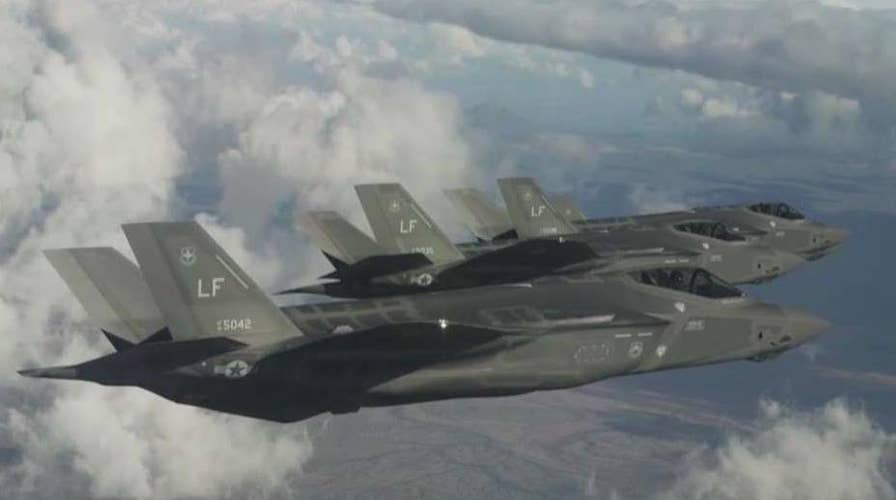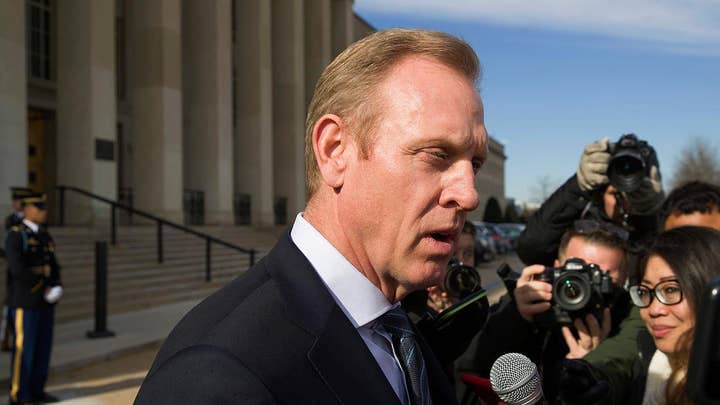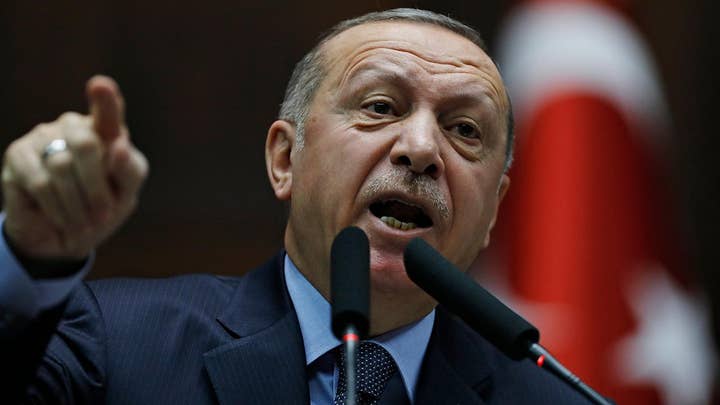NATO allies at odds as US halts F-35 jet parts sale to Turkey
The Pentagon suspends its delivery of a major weapons system over concerns about a deal with Russia; Lucas Tomlinson reports.
The Trump administration is locked in an escalating standoff with Turkey over its plans to purchase an air defense system from Russia, with a deadline fast-approaching for Ankara to back down or lose out on U.S.-made F-35s – and possibly more.
In a letter to Turkey’s Defense Minister Hulusi Akar, Acting Defense Secretary Patrick Shanahan pointedly threatened to block Turkey from receiving F-35 jets if the NATO member goes through with procuring the S-400 system.
TURKISH DIPLOMAT ALLEGES ABUSE IN DETAINMENT
“Turkey will not receive the F-35 if Turkey takes delivery of the S-400,” he wrote. “You still have the option to change course on the S-400.”
Turkey has been a joint participant in the F-35 Lightning II Joint Strike Fighter program since its Defense Industrial Executive Committee approved a block buy in 2016 for 24 aircraft over three contract years. The country already bought four F-35 fighter jets, which are being held at the Luke Air Force Base for now.
U.S. officials say Turkey’s procurement of the S-400 system could pose a threat to the F-35s, as the two systems are not “compatible” with each other. On June 7, Under Secretary of Defense for Acquisition and Sustainment Ellen M. Lord said at an off-camera press briefing that the U.S. does “not want to have the F-35 in close proximity to the S-400 over a period of time because of the ability to understand the profile of the F-35 on that particular piece of equipment.”
Now, Shanahan is giving Turkey until July 31 to cancel its plan to receive S-400 defense system, or be suspended from the F-35 program.
Yet Shanahan made clear the U.S. might not stop with suspending Turkey from the program. He hinted possible sanctions against Turkey could follow. “All actions taken on the F-35 are based on risks the S-400 presence in Turkey would have and they are separate from Russia-related Countering America's Adversaries Through Sanctions Act (CAATSA) sanctions. There is strong bipartisan U.S. Congressional determination to see CAATSA sanctions imposed on Turkey if Turkey acquires the S-400,” he wrote.
CAATSA sanctions could cover export sanctions as well as a shut-out from U.S. financial institutions, among other things.
Turkish Foreign Minister Mevlüt Çavuşoğlu responded harshly to the letter at a press conference in Ankara on Thursday.
“We do not accept the tone of this letter and no one can give Turkey an ultimatum,” he said. “Turkey has purchased the S-400s and the S-400s will come to Turkey.”
Earlier last week, the House of Representatives agreed on a resolution condemning Turkey’s move to purchase S-400 air defense systems from Russia. The deal “would endanger the integrity of the United States-Turkey alliance and undermine NATO,” the resolution said.
According to an unclassified report from the Department of Defense on the status of relationship with Turkey, the country has invested $1.25 billion toward the JSF Program, “with a planned procurement of 100 F-35As.”
Ellen M. Lord, in her remarks earlier this month, did not clarify if the U.S. would reimburse Turkey for the F-35s already purchased, but the department is discussing internally how to deal with the four aircraft that Turkey has already bought. She said she believes there is a desire to find a way forward, as Turkish Defense Minister Hulusi Akar continues to exchange calls and letters with his U.S. counterpart.
This “is not an irreversible decision,” she said. “If Turkey wants to stop procurement of S-400, we would very much like them to continue in the F-35 program.”
Turkish officials have yet to officially respond to Shanahan’s letter. But, a statement after a phone call on Thursday with Shanahan made clear the Turkish side was not happy with the tone of the letter.
“Minister Akar emphasized the improper wording not in line with the spirit of the Alliance in the letter Mr. Shanahan sent to him. Furthermore, starting with F-35, mutual views and requests within the context of bilateral security issues as well as defense industry cooperation issues were discussed,” the statement said.
Shanahan and Akar are expected to meet at the NATO Meeting of Defense Ministers in Brussels next week, but it comes as both sides are digging in.
President Trump has not personally weighed in on the issue yet. But Turkish President Recep Tayyip Erdoğan has stressed the deal is done. "We discussed the S-400 subject with Russia. Indeed the S-400 issue is settled," he said, talking reporters on his plane returning from a visit to Tajikistan on Sunday, NTV reported. "I think they will start to come in the first half of July."







